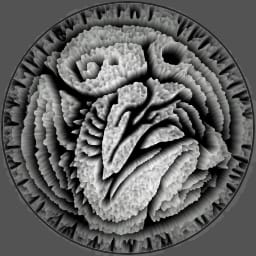Public
Script
v50
March 5, 2024
- blob_admin@tarasBlob Admin This is a lightweight Blob Admin interface to view and debug your Blob data. Use this button to install the val: It uses basic authentication with your Val Town API Token as the password (leave the username field blank). TODO [x] /new - render a page to write a new blob key and value [x] /edit/:blob - render a page to edit a blob (prefilled with the existing content) [x] /delete/:blob - delete a blob and render success [x] add upload/download buttons [ ] Use modals for create/upload/edit/view/delete page (htmx ?) [ ] handle non-textual blobs properly [ ] use codemirror instead of a textarea for editing text blobsHTTP
 valtownByExample@pomdtrVal town by example Usage Simple Example To add an example, just create a val. The val should start with a JSDoc style multi line comment that describes the example: /** * @title HTTP server: Hello World * @description An example of a HTTP server that serves a "Hello World" message. */ // this comment will be displayed on the left export const server = () => new Response("Hello world!") The title is required. Then, you can write the code. Code can be prefixed with a comment that describes the code. The comment will be rendered next to the code in the example page. Make sure your val is public, then go to https://pomdtr-val_town_by_example.web.val.run/v/<your-username>/<your-val> Using multiple vals You can add another val to your example by adding an @include directive /** * @title HTTP server: Hello World * @description An example of a HTTP server that serves a "Hello World" message. * @include pomdtr/secondary_val */ See @pomdtr/react_example Adding external resources to your example You can attach an external link to your val by using the @resource directive. External resources are specified using a markdown link. /** * @title HTTP server: Hello World * @description An example of a HTTP server that serves a "Hello World" message. * @resource [Val Town Docs](https://docs.val.town) **/ Adding examples to the homepage Just add your val in @pomdtr/val_town_by_example_tocHTTP
valtownByExample@pomdtrVal town by example Usage Simple Example To add an example, just create a val. The val should start with a JSDoc style multi line comment that describes the example: /** * @title HTTP server: Hello World * @description An example of a HTTP server that serves a "Hello World" message. */ // this comment will be displayed on the left export const server = () => new Response("Hello world!") The title is required. Then, you can write the code. Code can be prefixed with a comment that describes the code. The comment will be rendered next to the code in the example page. Make sure your val is public, then go to https://pomdtr-val_town_by_example.web.val.run/v/<your-username>/<your-val> Using multiple vals You can add another val to your example by adding an @include directive /** * @title HTTP server: Hello World * @description An example of a HTTP server that serves a "Hello World" message. * @include pomdtr/secondary_val */ See @pomdtr/react_example Adding external resources to your example You can attach an external link to your val by using the @resource directive. External resources are specified using a markdown link. /** * @title HTTP server: Hello World * @description An example of a HTTP server that serves a "Hello World" message. * @resource [Val Town Docs](https://docs.val.town) **/ Adding examples to the homepage Just add your val in @pomdtr/val_town_by_example_tocHTTP- blob_admin@curtcoxBlob Admin This is a lightweight Blob Admin interface to view and debug your Blob data. Forl this val to install: It uses basic authentication with your Val Town API Token as the password (leave the username field blank). TODO [ ] handle non-textual blobs properly [ ] upload a blob by dragging it in (ondrop dropzone on the whole homepage) [ ] add upload/download buttons [ ] merge edit and view pages [ ] add client side navigation using htmx [ ] use codemirror instead of a textarea for editing text blobsHTTP
- sqliteExplorerApp@burcsSQLite Explorer View and interact with your Val Town SQLite data. It's based off Steve's excellent SQLite Admin val, adding the ability to run SQLite queries directly in the interface. This new version has a revised UI and that's heavily inspired by LibSQL Studio by invisal . This is now more an SPA, with tables, queries and results showing up on the same page. Install Install the latest stable version (v86) by forking this val: Authentication Login to your SQLite Explorer with password authentication with your Val Town API Token as the password. Todos / Plans [ ] improve error handling [ ] improve table formatting [ ] sticky table headers [x] add codemirror [ ] add loading indication to the run button (initial version shipped) [ ] add ability to favorite queries [ ] add saving of last query run for a table (started) [ ] add visible output for non-query statements [ ] add schema viewing [ ] add refresh to table list sidebar after CREATE/DROP/ALTER statements [ ] add automatic execution of initial select query on double click [x] add views to the sidebar [ ] add triggers to sidebar [ ] add upload from SQL, CSV and JSON [ ] add ability to connect to a non-val town Turso database [x] fix wonky sidebar separator height problem (thanks to @stevekrouse) [x] make result tables scrollable [x] add export to CSV, and JSON (CSV and JSON helper functions written in this val . Thanks to @pomdtr for merging the initial version!) [x] add listener for cmd+enter to submit queryHTTP
- dateme@tmcwDate Me Directory This is entry-point val for the source code for the Date Me Directory. Contributions welcome! This app uses Hono as the server framework and for JSX . The vals are stored in Val Town SQLite . Contributing Forking this repo should mostly work, except for the sqlite database. You'll need to create the table & populate it with some data. This script should do it, but I think it has a couple bugs. If you're interested in contributing to this project contact me or comment on this val and I'll get it working for ya! Todos [ ] Make the SQLite database forkable and build a widget/workflow for that, ie fix @stevekrouse/dateme_sqlite [ ] Require an email (that isn't shared publicly) [ ] Verify the email address with a "magic link" [ ] Refactor Location to an array of Lat, Lon [ ] Geocode all the existing locations [ ] Add a geocoder map input to the form [ ] Allow selecting multiple location through the form [ ] Profile performance & speed up site, possibly add more caching [ ] Let people edit their forms [ ] Featured profilesHTTP
 blob_admin@stevekrouseBlob Admin This is a lightweight Blob Admin interface to view and debug your Blob data. Use this button to install the val: It uses basic authentication with your Val Town API Token as the password (leave the username field blank). TODO [x] /new - render a page to write a new blob key and value [x] /edit/:blob - render a page to edit a blob (prefilled with the existing content) [x] /delete/:blob - delete a blob and render success [x] add upload/download buttons [ ] Use modals for create/upload/edit/view/delete page (htmx ?) [ ] handle non-textual blobs properly [ ] use codemirror instead of a textarea for editing text blobsHTTP
blob_admin@stevekrouseBlob Admin This is a lightweight Blob Admin interface to view and debug your Blob data. Use this button to install the val: It uses basic authentication with your Val Town API Token as the password (leave the username field blank). TODO [x] /new - render a page to write a new blob key and value [x] /edit/:blob - render a page to edit a blob (prefilled with the existing content) [x] /delete/:blob - delete a blob and render success [x] add upload/download buttons [ ] Use modals for create/upload/edit/view/delete page (htmx ?) [ ] handle non-textual blobs properly [ ] use codemirror instead of a textarea for editing text blobsHTTP- sqliteExplorerApp@stefSQLite Explorer View and interact with your Val Town SQLite data. It's based off Steve's excellent SQLite Admin val, adding the ability to run SQLite queries directly in the interface. This new version has a revised UI and that's heavily inspired by LibSQL Studio by invisal . This is now more an SPA, with tables, queries and results showing up on the same page. Install Install the latest stable version (v86) by forking this val: Authentication Login to your SQLite Explorer with password authentication with your Val Town API Token as the password. Todos / Plans [ ] improve error handling [ ] improve table formatting [ ] sticky table headers [x] add codemirror [ ] add loading indication to the run button (initial version shipped) [ ] add ability to favorite queries [ ] add saving of last query run for a table (started) [ ] add visible output for non-query statements [ ] add schema viewing [ ] add refresh to table list sidebar after CREATE/DROP/ALTER statements [ ] add automatic execution of initial select query on double click [x] add views to the sidebar [ ] add triggers to sidebar [ ] add upload from SQL, CSV and JSON [ ] add ability to connect to a non-val town Turso database [x] fix wonky sidebar separator height problem (thanks to @stevekrouse) [x] make result tables scrollable [x] add export to CSV, and JSON (CSV and JSON helper functions written in this val . Thanks to @pomdtr for merging the initial version!) [x] add listener for cmd+enter to submit queryHTTP
 love_letter@pomdtr<3 Val Town Val Town is my new favourite thing. Never heard of it ? Well, according to it's homepage, Val Town is a social website to write and deploy TypeScript. It's often introduced as zappier for developers , or twitter for code . The idea is simple: you write down a javascript snippet (named vals) in your browser, and it's instantly executed on a server. You can use it to: execute a function on a cron schedule host a small websites (this article hosted on Val Town ) send yourself emails ... But there is more to Val Town than this. If you take a look at the trending vals , you will quickly notice a pattern: most of the vals are about Val Town itself. People are using Val Town to extend Val Town, and it's fascinating to see what they come up with. I've built a few of these extensions myself, and this article is about one of them. Fixing the Val Town Search Val.town is built around the http import feature of Deno. Each val is a standalone module, that you can import in other vals. It works both for your own vals, and for the vals of other users. All of this is great, but there is one big issue: the search feature is terrible . It only works for exact text matches, and there is no way to set any filters based on username , creation_date , or anything else. This makes it really hard to find a val you are looking for, even if you are the one who wrote it. In any other platform, I would have just given up and moved on. But Val Town is different. I was confident that I could address this issue in userspace, without having to wait for the platform to implement it. Val Town allows you to run a val on a cron schedule, so I wrote a val that would fetch all the vals from the API, and store them as a sqlite table (did I mention that every user get it's own sqlite database ?). const createQuery = `CREATE TABLE IF NOT EXISTS vals ( ... );`; // run every hour export default function(interval: Interval) { // create the val table await options.sqlite.execute(createQuery); let url = "https://api.val.town/v1/search/vals?query=%20&limit=100"; // fetch all vals, and store them in the sqlite table while (true) { const resp = await fetch(url); if (!resp.ok) { throw new Error(await resp.text()); } const res = await resp.json(); const rows = res.data.map(valToRow); await insertRows(rows, options); if (!res.links.next) { break; } url = res.links.next; } } Once the val had finished running, I had a table with all the vals from the platform. I could now run queries on this table to find the vals I was looking for. import { sqlite } from "https://esm.town/v/std/sqlite" const res = await sqlite.execute(`SELECT * FROM vals WHERE author = 'pomdtr' && code LIKE '%search%'`); Of course I could have stopped there, but I wanted to go further. I wanted to share this table with other users, so they could run their own queries on it. Isolating the Vals Table There was still a challenge to overcome: the table was part of my account database, and I didn't want to give everyone access to it (there are some sensitive tables in there). One way to solve this issue would be to publish a stripped-down api that only allows a few predefined queries. But that would be boring, and I wanted to give users the full power of SQL. So I decided to isolate the val table in a separate account. There is a neat trick to achieve this on val.town: each val get's it own email address, and email sent to vals can be forwarded to your own email address. import { email as sendEmail } from "https://esm.town/v/std/email?v=11"; // triggered each time an email is sent to pomdtr.sqlite_email@valtown.email export default async function(email: Email) { // forward the email to my own email address await sendEmail({ subject: email.subject, html: email.html, text: email.text, }); } Since val.town account can be created with a val.email address, you can create an infinite number of accounts (and thus sqlite databases) using this trick. So say hello to the sqlite account , which is a separate account that only contains the vals table. After creating the account, I just needed to fork the cron val from my main account to get a copy of the vals table in the sqlite account. Publishing the Table The val.town stdlib provides a neat rpc function that provides a simple way to expose a function as an API. So I decided to write a simple val that would run a query on the table, and return the result. import { rpc } from "https://esm.town/v/std/rpc?v=5"; import { InStatement, sqlite } from "https://esm.town/v/std/sqlite?v=4"; // rpc create an server, exposed on the val http endpoint export default rpc(async (statement: InStatement) => { try { // run the query, then return the result as json return await sqlite.execute(statement); } catch (e) { throw new Response(e.message, { status: 500, }); } }); Everyone can now run queries on the table thanks a publically accessible endpoint (you even have write access to it, but I trust you to not mess with it). You can test it locally using curl and jq : echo "SELECT * FROM vals WHERE lower(name) LIKE '%feed%' and lower(name) like '%email%' LIMIT 100" | jq -R '{args: [.]} ' | xargs -0 -I {} curl -X POST "https://sqlite-execute.web.val.run" -H "Content-Type: application/json" -d {} | jq Of course I don't expect the average val.town user to use shell commands to run queries, so I also built an helper val to interact with the API, allowing users to run queries from their own vals. // only the import changed from the previous example import { db } from "https://esm.town/v/sqlite/db"; // this query will run on the `sqlite` account const res = await db.execute(`SELECT * FROM vals WHERE author = 'pomdtr' && code LIKE '%search%'`); I've seen some really cool vals built on top of this API. Someone even wrote down a guide to help users interact with it from the command-line! I hope that someone will build an search UI to interact with it at some point, but in the meantime, you can use a community-contributed sqlite web interface to run queries on top of the vals table. Val.town as a code-taking app As I've tried to show, having both a runtime, an editor and an API on the same platform is quite a magic formula. It's probably why val.town resonates so much with me. Using CodeSandbox, Stackblitz, Repl.it, Gitpod, Github Codespaces or Gitpod feels pretty much the same, everything still revolves around the same concept of a project/repository. They feel uninspired somehow, trying to replicate the desktop IDE experience in the browser, instead of embracing the new possibilities that the web platform offers. Val.town breaks this mold. I see it as a code-taking app, a place where I can just dump my ideas without worrying about the usual frictions of writing and deploying code.HTTP
love_letter@pomdtr<3 Val Town Val Town is my new favourite thing. Never heard of it ? Well, according to it's homepage, Val Town is a social website to write and deploy TypeScript. It's often introduced as zappier for developers , or twitter for code . The idea is simple: you write down a javascript snippet (named vals) in your browser, and it's instantly executed on a server. You can use it to: execute a function on a cron schedule host a small websites (this article hosted on Val Town ) send yourself emails ... But there is more to Val Town than this. If you take a look at the trending vals , you will quickly notice a pattern: most of the vals are about Val Town itself. People are using Val Town to extend Val Town, and it's fascinating to see what they come up with. I've built a few of these extensions myself, and this article is about one of them. Fixing the Val Town Search Val.town is built around the http import feature of Deno. Each val is a standalone module, that you can import in other vals. It works both for your own vals, and for the vals of other users. All of this is great, but there is one big issue: the search feature is terrible . It only works for exact text matches, and there is no way to set any filters based on username , creation_date , or anything else. This makes it really hard to find a val you are looking for, even if you are the one who wrote it. In any other platform, I would have just given up and moved on. But Val Town is different. I was confident that I could address this issue in userspace, without having to wait for the platform to implement it. Val Town allows you to run a val on a cron schedule, so I wrote a val that would fetch all the vals from the API, and store them as a sqlite table (did I mention that every user get it's own sqlite database ?). const createQuery = `CREATE TABLE IF NOT EXISTS vals ( ... );`; // run every hour export default function(interval: Interval) { // create the val table await options.sqlite.execute(createQuery); let url = "https://api.val.town/v1/search/vals?query=%20&limit=100"; // fetch all vals, and store them in the sqlite table while (true) { const resp = await fetch(url); if (!resp.ok) { throw new Error(await resp.text()); } const res = await resp.json(); const rows = res.data.map(valToRow); await insertRows(rows, options); if (!res.links.next) { break; } url = res.links.next; } } Once the val had finished running, I had a table with all the vals from the platform. I could now run queries on this table to find the vals I was looking for. import { sqlite } from "https://esm.town/v/std/sqlite" const res = await sqlite.execute(`SELECT * FROM vals WHERE author = 'pomdtr' && code LIKE '%search%'`); Of course I could have stopped there, but I wanted to go further. I wanted to share this table with other users, so they could run their own queries on it. Isolating the Vals Table There was still a challenge to overcome: the table was part of my account database, and I didn't want to give everyone access to it (there are some sensitive tables in there). One way to solve this issue would be to publish a stripped-down api that only allows a few predefined queries. But that would be boring, and I wanted to give users the full power of SQL. So I decided to isolate the val table in a separate account. There is a neat trick to achieve this on val.town: each val get's it own email address, and email sent to vals can be forwarded to your own email address. import { email as sendEmail } from "https://esm.town/v/std/email?v=11"; // triggered each time an email is sent to pomdtr.sqlite_email@valtown.email export default async function(email: Email) { // forward the email to my own email address await sendEmail({ subject: email.subject, html: email.html, text: email.text, }); } Since val.town account can be created with a val.email address, you can create an infinite number of accounts (and thus sqlite databases) using this trick. So say hello to the sqlite account , which is a separate account that only contains the vals table. After creating the account, I just needed to fork the cron val from my main account to get a copy of the vals table in the sqlite account. Publishing the Table The val.town stdlib provides a neat rpc function that provides a simple way to expose a function as an API. So I decided to write a simple val that would run a query on the table, and return the result. import { rpc } from "https://esm.town/v/std/rpc?v=5"; import { InStatement, sqlite } from "https://esm.town/v/std/sqlite?v=4"; // rpc create an server, exposed on the val http endpoint export default rpc(async (statement: InStatement) => { try { // run the query, then return the result as json return await sqlite.execute(statement); } catch (e) { throw new Response(e.message, { status: 500, }); } }); Everyone can now run queries on the table thanks a publically accessible endpoint (you even have write access to it, but I trust you to not mess with it). You can test it locally using curl and jq : echo "SELECT * FROM vals WHERE lower(name) LIKE '%feed%' and lower(name) like '%email%' LIMIT 100" | jq -R '{args: [.]} ' | xargs -0 -I {} curl -X POST "https://sqlite-execute.web.val.run" -H "Content-Type: application/json" -d {} | jq Of course I don't expect the average val.town user to use shell commands to run queries, so I also built an helper val to interact with the API, allowing users to run queries from their own vals. // only the import changed from the previous example import { db } from "https://esm.town/v/sqlite/db"; // this query will run on the `sqlite` account const res = await db.execute(`SELECT * FROM vals WHERE author = 'pomdtr' && code LIKE '%search%'`); I've seen some really cool vals built on top of this API. Someone even wrote down a guide to help users interact with it from the command-line! I hope that someone will build an search UI to interact with it at some point, but in the meantime, you can use a community-contributed sqlite web interface to run queries on top of the vals table. Val.town as a code-taking app As I've tried to show, having both a runtime, an editor and an API on the same platform is quite a magic formula. It's probably why val.town resonates so much with me. Using CodeSandbox, Stackblitz, Repl.it, Gitpod, Github Codespaces or Gitpod feels pretty much the same, everything still revolves around the same concept of a project/repository. They feel uninspired somehow, trying to replicate the desktop IDE experience in the browser, instead of embracing the new possibilities that the web platform offers. Val.town breaks this mold. I see it as a code-taking app, a place where I can just dump my ideas without worrying about the usual frictions of writing and deploying code.HTTP purpleOctopus@stevekrouseDate Me Directory This is the source code for the Date Me Directory. Contributions welcome! Architecture This version of the site still uses Notion to store the data and NoteForms for the form to get your submission into Notion. I intend to cut Notion out of the equation shortly by building our own HTML form that writes data directly to my sqlite database. This val is the router for the application @stevekrouse/getDocs pulls the date me docs from my sqlite database. @stevekrouse/dateme_notion_sync syncs my data from Notion to my sqlite database every 10 minutes Todos [ ] Make a form to send data directly to sqlite (in progress: @stevekrouse/date_me_form) [ ] Require an email (that isn't shared publicly) [ ] Filters: Gender, Interested In, Style, Location, etc [ ] Table: hide location, location flexibility, community, contact, last updated in more details [ ] Refactor Location to an array of Lat, Lon [ ] Geocode all the existing locations [ ] Add a geocoder map input to the form [ ] Allow selecting multiple location through the form [ ] Profile performance & speed up site, possibly add more caching [ ] Let people edit their forms [ ] Featured profilesHTTP
purpleOctopus@stevekrouseDate Me Directory This is the source code for the Date Me Directory. Contributions welcome! Architecture This version of the site still uses Notion to store the data and NoteForms for the form to get your submission into Notion. I intend to cut Notion out of the equation shortly by building our own HTML form that writes data directly to my sqlite database. This val is the router for the application @stevekrouse/getDocs pulls the date me docs from my sqlite database. @stevekrouse/dateme_notion_sync syncs my data from Notion to my sqlite database every 10 minutes Todos [ ] Make a form to send data directly to sqlite (in progress: @stevekrouse/date_me_form) [ ] Require an email (that isn't shared publicly) [ ] Filters: Gender, Interested In, Style, Location, etc [ ] Table: hide location, location flexibility, community, contact, last updated in more details [ ] Refactor Location to an array of Lat, Lon [ ] Geocode all the existing locations [ ] Add a geocoder map input to the form [ ] Allow selecting multiple location through the form [ ] Profile performance & speed up site, possibly add more caching [ ] Let people edit their forms [ ] Featured profilesHTTP- TodoApp@mjweaver01SSR React Mini & SQLite Todo App This Todo App is server rendered and client-hydrated React. This architecture is a lightweight alternative to NextJS, RemixJS, or other React metaframeworks with no compile or build step. The data is saved server-side in Val Town SQLite . SSR React Mini Framework This "framework" is currently 44 lines of code, so it's obviously not a true replacement for NextJS or Remix. The trick is client-side importing the React component that you're server rendering . Val Town is uniquely suited for this trick because it both runs your code server-side and exposes vals as modules importable by the browser. The tricky part is making sure that server-only code doesn't run on the client and vice-versa. For example, because this val colocates the server-side loader and action with the React component we have to be careful to do all server-only imports (ie sqlite) dynamically inside the loader and action , so they only run server-side.HTTP
- sqliteExplorerApp@kamekSQLite Explorer View and interact with your Val Town SQLite data. It's based off Steve's excellent SQLite Admin val, adding the ability to run SQLite queries directly in the interface. This new version has a revised UI and that's heavily inspired by LibSQL Studio by invisal . This is now more an SPA, with tables, queries and results showing up on the same page. Install Install the latest stable version (v81) by forking this val: Authentication Login to your SQLite Explorer with password authentication with your Val Town API Token as the password. Todos / Plans [ ] improve error handling [ ] improve table formatting [ ] sticky table headers [x] add codemirror [ ] add loading indication to the run button (initial version shipped) [ ] add ability to favorite queries [ ] add saving of last query run for a table (started) [ ] add visible output for non-query statements [ ] add schema viewing [ ] add refresh to table list sidebar after CREATE/DROP/ALTER statements [ ] add automatic execution of initial select query on double click [x] add views to the sidebar [ ] add triggers to sidebar [ ] add upload from SQL, CSV and JSON [ ] add ability to connect to a non-val town Turso database [x] fix wonky sidebar separator height problem (thanks to @stevekrouse) [x] make result tables scrollable [x] add export to CSV, and JSON (CSV and JSON helper functions written in this val . Thanks to @pomdtr for merging the initial version!) [x] add listener for cmd+enter to submit queryHTTP
- TodoApp@summerboysSSR React Mini & SQLite Todo App This Todo App is server rendered and client-hydrated React. This architecture is a lightweight alternative to NextJS, RemixJS, or other React metaframeworks with no compile or build step. The data is saved server-side in Val Town SQLite . SSR React Mini Framework This "framework" is currently 44 lines of code, so it's obviously not a true replacement for NextJS or Remix. The trick is client-side importing the React component that you're server rendering . Val Town is uniquely suited for this trick because it both runs your code server-side and exposes vals as modules importable by the browser. The tricky part is making sure that server-only code doesn't run on the client and vice-versa. For example, because this val colocates the server-side loader and action with the React component we have to be careful to do all server-only imports (ie sqlite) dynamically inside the loader and action , so they only run server-side.HTTP
v50
March 5, 2024








